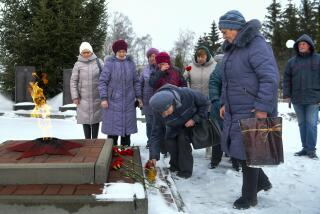Russian Plane Lands in Iraq Without U.N. OK
- Share via
BAGHDAD — Iraqi officials welcomed a Russian plane Saturday--the second aircraft to land in two days without U.N. clearance--as evidence that the United Nations’ decade-old trade sanctions were collapsing despite U.S. and British objections.
The Tupolev-154 carrying 5 tons of medical supplies and 143 passengers, most of them businessmen, landed in Baghdad after its crew informed the U.N. sanctions committee in New York of its destination but did not wait for authorization.
A French plane had arrived Friday carrying doctors, artists and athletes opposed to the sanctions imposed after Iraq invaded Kuwait in 1990.
“These flights are an indication that both America and Britain have failed in their attempts to isolate Iraq,” said Abdul Razzaq Hashemi, a senior member of Iraq’s ruling Arab Baath Socialist Party.
“Iraq is very important. No one can ignore a country with potentials like ours,” he said.
The flights have so emboldened Iraq that Hashemi said the government will reject future requests to fly to Baghdad, the capital, if organizers secure U.N. permission beforehand.
The U.N. Security Council is divided on the flights to Iraq, with the United States and Britain trying to prevent nations from punching holes in the sanctions. Russia and France maintain that U.N. authorization is not required for humanitarian aid flights. After Friday’s flight, France’s U.N. ambassador, Jean-David Levitte, said “there will be other flights.”
State Department spokesman Richard Boucher called the French flight a “blatant violation” of sanctions and U.N. procedures.
The presence of business executives on the Russian plane conflicted with the flight’s declared humanitarian mission. The executives were led by Yuri K. Shafranik, the president of Russia’s Central Fuel Co. and a former energy minister.
Other Russians on the plane were artists and athletes. The French plane also carried entertainers.
The U.S. and Britain vehemently oppose a resumption of passenger flights, saying they would be an economic resource and therefore a breach of the sanctions.
U.N. resolutions require the sanctions to remain in place until Iraq complies with demands to dismantle its weapons of mass destruction.
More to Read
Sign up for Essential California
The most important California stories and recommendations in your inbox every morning.
You may occasionally receive promotional content from the Los Angeles Times.













